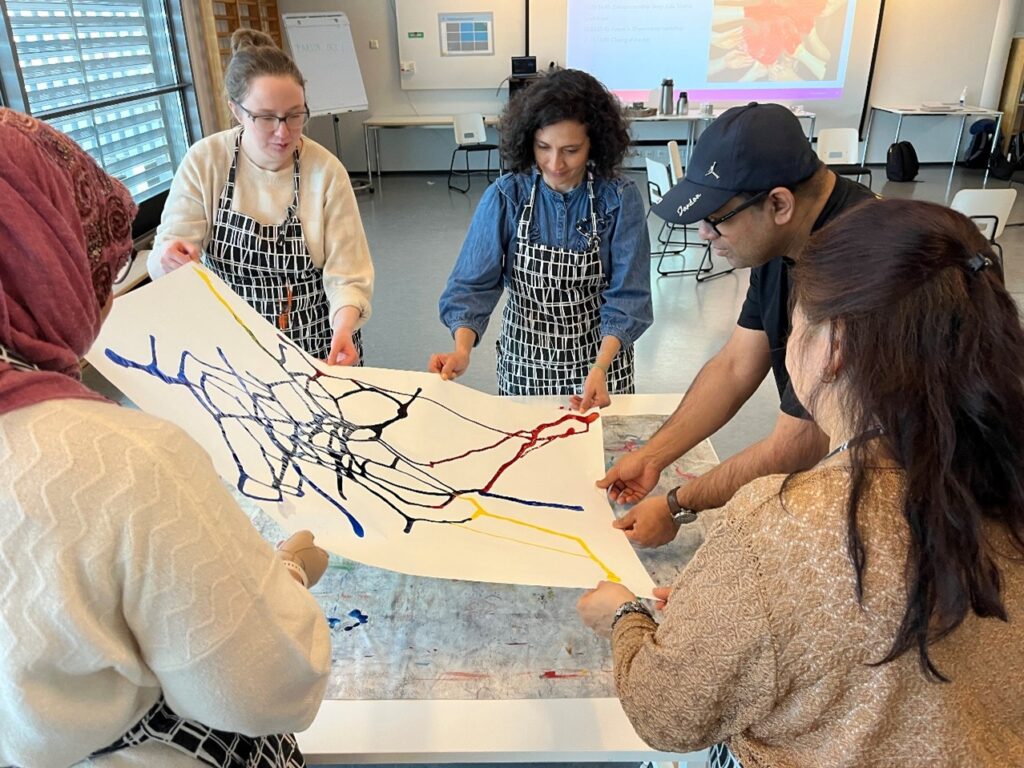An entrepreneurial spirit extends far beyond the realm of business ownership—it is a dynamic way of thinking that holds value for individuals in all walks of life. At its essence, it is a mindset that embodies curiosity about the world, the courage to experiment and innovate, and the confidence to take initiative. Strengthening the entrepreneurial spirit by using creative methods is at the core of Immigrants as Business Mentors (IMIB) project. Our creative entrepreneurship coaching workshops are specifically tailored for international talents interested in entrepreneurship.

Photo by Chandlerlikes / Adobe Stock (Laurean Education-licence)
In this article, ChatGPT has been used to edit the language of the text and to make the text more fluent.
What is the entrepreneurial spirit about?
Entrepreneurial spirit is rooted in adaptability, resilience, and a commitment to continuous learning and personal growth. Whether applied in the workplace, in academic settings, or in everyday life, this mindset empowers individuals to recognize opportunities, address challenges creatively, and navigate uncertainty with confidence. Embracing an entrepreneurial spirit fosters forward-thinking, problem-solving, and being proactive – qualities that are essential not only for starting a business, but for thriving in any career or life path. By cultivating competences such as responsibility, initiative, and flexibility, individuals are better equipped to succeed in a rapidly changing world.
The entrepreneurial mindset is more than a set of attitudes; it is a foundational element of entrepreneurship competence itself. This is clearly articulated in the EntreComp framework—the Entrepreneurship Competence Framework developed by the European Union—which offers a comprehensive model for understanding entrepreneurship as a competence that transcends traditional business contexts (European Commission 2016). EntreComp serves as a practical and conceptual tool to identify, develop, and assess a wide range of skills and competences relevant to entrepreneurship.
The framework defines entrepreneurship as “a transversal competence, which applies to all spheres of life” (European Commission 2016). It is closely linked to personal development, active citizenship, and professional growth, whether in the context of self-employment or social innovation. By positioning entrepreneurship as a life-wide competence, EntreComp expands its relevance to diverse fields and individuals.
Among the core competences identified by EntreComp are self-awareness and self-efficacy, which underscore the importance of introspection, recognizing personal strengths and limitations, and committing to lifelong personal development. Motivation and perseverance also feature prominently, reflecting the necessity of resilience in navigating an increasingly complex and uncertain world.
Creativity and forward-thinking are similarly emphasized as vital entrepreneurial competences. The ability to scan the social, cultural, and economic environment in order to identify emerging needs and opportunities is foundational to entrepreneurial action. Creativity facilitates the generation of novel ideas in response to these opportunities and supports the integration of diverse knowledge and resources to develop innovative solutions.

Picture 1: Elements of entrepreneurial spirit in which the IMIB entrepreneurship coaching workshops focus on (picture: Satu Bethell)
Creative methods as enablers of entrepreneurial self-efficacy and hope
Given the significance of entrepreneurship as a form of employment among international talents in Finland, fostering entrepreneurial thinking is both timely and essential. In 2022, 11,9 % of immigrants employed were entrepreneurs, and the number has been growing since 2018 (Alakoski & Busk 2025). Strengthening the entrepreneurial spirit is a key element in Immigrants as Business Mentors project, a collaborative initiative under the 3UAS alliance, in which Laurea UAS is a partner. The project aims to support the employment and integration of international talents in Finland by enhancing their career prospects through three interlinked pathways: connecting international talents with Finnish companies, providing targeted career coaching, and strengthening their entrepreneurship competences.
Laurea is responsible for the design and implementation of entrepreneurship coaching workshops. During the project, there are four implementations. Each implementation consists of 5 workshops. So far, there have been 11 participants from different cultural backgrounds participating in the workshops. The workshops are specifically tailored for international talents who are either considering entrepreneurship as a career path or are seeking to cultivate an entrepreneurial mindset as part of their professional development.
Our entrepreneurship coaching workshops are rooted in the understanding that entrepreneurship is not only about starting a business but also about developing a mindset characterized by curiosity, initiative, creativity, and resilience. Drawing on the European Commission’s EntreComp framework, the workshops aim to support participants in identifying and building key entrepreneurial competences such as self-awareness, self-efficacy, motivation, and hope. The coaching sessions are interactive, reflective, and creative, offering a safe and supportive environment where participants can explore their aspirations, overcome limiting beliefs, and engage in collaborative learning.
In our entrepreneurship coaching workshops, we employ creative methods to strengthen the participants’ self-efficacy, future-oriented thinking and sense of hope. These methods were designed not only to support individual empowerment but also to foster a psychologically safe and trustful group environment. Among them were projective image cards, used as reflective tools to help participants express thoughts, aspirations, and personal insights. Additionally, collaborative painting activities were employed to cultivate a sense of belonging and to lower the barriers to emotional expression. These creative practices served as mediating tools that facilitated self-exploration, encouraged the articulation of personal and professional dreams, and supported the development of trust within the group. An environment of trust encouraged the participants to start creating their business ideas and to pitch their ideas and competences to the group.

Picture 2: Entrepreneurship coaching participants taking part in fluid collaboration (picture: Satu Bethell)
The workshops create an environment centered on meaningful encounters, characterized by a fun and playful atmosphere that encourages openness and experimentation. The workshops provide a safe space for participants to reflect, collaborate, and build the courage to follow their own paths. They offer more than just knowledge—they serve as platforms for uncovering hidden skills and competencies, while simultaneously challenging limiting beliefs or mental blocks that may hinder personal growth. The experiences and entrepreneurship stories of visiting entrepreneurs provided the participants with inspiration and networking opportunities.
Within these collaborative learning environments, knowledge is co-created, enabling participants to reflect collectively on their entrepreneurial capacities and to gain new, empowering perspectives. This collective process not only enhances individual confidence but also strengthens the sense of belonging and shared purpose, which is particularly valuable for early-stage or small-scale entrepreneurs. By sharing experiences and exchanging diverse business ideas, participants contribute to a broader culture of innovation, making it easier to identify opportunities and co-create solutions with real societal impact.
In summary, these workshops offer a holistic blend of creative facilitation, peer support, and experiential learning. They provide the necessary feedback, inspiration, and networks that aspiring entrepreneurs need to transform their visions into tangible ventures grounded in hope, agency, and meaningful connection. By integrating these methods, the training created spaces where entrepreneurial identity and agency could be developed in a supportive and imaginative manner. The creative processes helped participants reframe challenges, visualize alternative futures, and anchor their entrepreneurial thinking in hope and possibility.
Embracing the Entrepreneurial Journey
At the heart of entrepreneurship lies a deeply human impulse—the desire to envision a better future and to actively shape it. Entrepreneurship, in this sense, becomes not just a career path or an economic activity, but a personal and societal act of imagining, designing, and realizing possibility.
Throughout this article, we have explored how the entrepreneurial mindset—marked by adaptability, resilience, creativity, and initiative—functions as a transversal competence, applicable to all spheres of life. As illustrated by the EntreComp framework, entrepreneurship is less about the formal act of starting a business and more about cultivating the capacities that allow individuals to thrive in complexity, contribute meaningfully to society, and respond proactively to emerging opportunities.
In the context of the Immigrants as Business Mentors project, our work with international talents demonstrates the power of entrepreneurship education when rooted in creativity, reflection, and collaboration. The coaching workshops are designed not merely to transfer knowledge, but to help participants uncover hidden competences, develop self-efficacy, and gain the confidence to imagine and pursue new futures.
The truth is, we all possess the potential to be entrepreneurial. Each individual carries within them the capacity to dream, to create, and to contribute in unique and impactful ways. Entrepreneurship offers a vehicle through which people can transform inner potential into outward action. However, recognizing this potential often requires encouragement, a supportive environment, and opportunities to challenge internal barriers or limiting beliefs.
To be entrepreneurial is to embrace the courage to step outside one’s comfort zone, to challenge conventional thinking, and to believe in the possibility of meaningful change. It involves the willingness to experiment, to fail, and to try again. It is a process of continual becoming—of discovering not only what we can do, but who we are when we act with intention and imagination.
As such, the entrepreneurial journey is open to all. It begins not with a business plan, but with a shift in perspective. And sometimes, all it takes is a single step—an idea explored, a workshop attended, a conversation had—to awaken the entrepreneurial spirit that lies within. When we support individuals in taking that step, we do more than foster innovation; we empower them to shape the future, for themselves and for the communities they serve.
Immigrants as Business Mentors is a 3UAS project co-funded by the European Social Fund (ESF+). The project is coordinated by Haaga-Helia UAS with Laurea UAS and Metropolia UAS acting as project partners.
References
- Alakoski, J. & Busk, H. 2025. Maahanmuuttajien merkitys yritys- ja elinkeinotoiminnassa. Pellervon taloustutkimus PTT.
- European Commission 2016. Joint Research Centre, Bacigalupo, M., Kampylis, P., Punie, Y. and Brande, G. V. d., EntreComp – The entrepreneurship competence framework, Publications Office, 2016, https://data.europa.eu/doi/10.2791/160811. Viitattu 8.4.2025.
- Morrow, R. 2006. Hope, entrepreneurship and foresight. Regional frontiers of entrepreneurship research: Compilation of papers of the third AGSE international entrepreneurship research exchange [CD]. Melbourne: Swinburne University, 606-618.
- ChatGPT has been used to edit the language of this text.
The first image in this article (the feature image) is not licensed under CC BY-SA. It has been used in accordance with the terms of the Adobe Stock Education License and may not be reused or redistributed without separate permission.